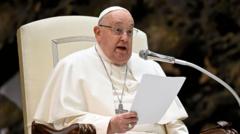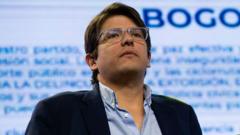Pope Francis's health has shown slight improvements as reported by the Vatican, though he continues to be in critical condition. Initially admitted for respiratory and kidney complications, latest information indicates that a minor kidney issue is no longer alarming. The Vatican has announced that the pope experienced no further episodes of respiratory distress, which had raised significant concerns just days prior.
At 88 years old, the pontiff is receiving oxygen therapy and has commenced light duties, including reading and signing documents. Most notably, he has resumed his practice of reaching out to the Parish of Gaza, a gesture reflecting his closeness to this community amidst ongoing turmoil. Such calls have become a crucial aspect of his routine, maintaining spiritual support even from his hospital bed.
While the latest updates bring a sense of relief regarding the Pope's eating habits and mobility—he is reportedly able to move independently and is free from fever or signs of sepsis—doctors have yet to share a prognosis for his condition. This lack of definitive outlook remains a point of tension, particularly after his recent respiratory crisis.
Vatican figures have organized nightly prayers outside St. Peter’s Basilica, unifying cardinals, clergy, and laypeople in hope for the Pope’s recovery. These gatherings will incorporate recitation of the Rosary led by Cardinal Parolin, the Vatican's Secretary of State. Given the Pope's susceptibility to pneumonia—stemming from lung issues faced in his youth and previous health challenges—his continued care remains paramount. As the first Latin American and Jesuit Pope, Francis’s leadership during his 12-year tenure has been characterized by a focus on inclusivity, compassion, and spiritual guidance for some of the world's most challenging crises.




















